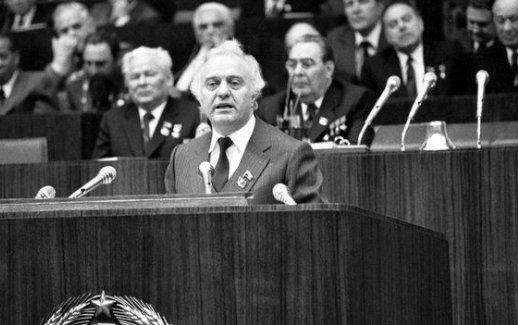CURRENT AFFAIRS UNIT, RADIO KWARA, ILORIN
PROGRAMME: NEWS COMMENTARY
DATE OF BROADCAST: 29/3/90 AT 1810 HOURS
WRITER: LANRE KAWU
At the beginning of this week, the soviet Foreign Minister, Eduard Shevardnadze, concluded a visit to the African continent. The trip, his first to Africa, took him to Angola, Zambia, Namibia, Tanzania, Zimbabwe, and Nigeria. A real “whistle-stop” tour, by any standards, it offered an opportunity for the Foreign Minister, a key member of the Soviet leadership, an opportunity to see developments in Africa, for himself, first hand.
It was indicative of the importance of the new developments in Southern Africa, one of the traditional areas of regional tension, that this region was first chosen for a visit to Africa, by Shevardnadze. The Soviet Union, along with the United States, had greatly facilitated the movement which culminated in the independence of Namibia, on March 21st.
During the visit to Angola, the Soviet Foreign Minister was able to review with the Angolan leader, the program of national reconciliation in that country, long devastated by a civil war, imposed by the bandits of UNITA, aided by the United States, and the racist South African regime. While pledging further aid for the reconstruction of Angolan economy, Shevardnadze agreed, that the main issue that face the country, was to stop the war.
In Lusaka, he met with President Kenneth Kaunda, Chairman of the Frontline States, who was able to report of the breath-taking pace of changes in the region. It was also an opportunity to receive thanks for the past acts of solidarity, for the struggle waged by the people of the region. However, the highlight of his stopover in Lusaka, was the meeting of the Soviet Foreign Minister, held with the ANC, recently re-legalised in South Africa. A traditional. Relationship has long been in place with that liberation organisation, and the Soviet Union. The need to work in legal circumstances inside the country, meant new demands, in the area of finance. At the conclusion of their meeting, both sides agreed that far-reaching agreements had again been reached.
During Shevardnadze’s visit to Windhoek, for the celebration of Namibian independence, he was able to take part in wide-ranging diplomatic démarches, which journalists described, as some of the most interesting, in recent times. There were meetings with his American counterpart, James Baker, to review many regional issues, along with the first high level contacts between South Africa and Soviet Union in over three decades, when he met President F.W. De Klerk.
Addressing a new conference at the end of the visit to Southern Africa, the Soviet Foreign Minister observed, and believed rightly, that Namibia’s independence offered the right backdrop for the resolution of the civil wars in Angola and Mozambique. He, similarly observed, that the dismantling of the apartheid system in South Africa, would be one of the greatest victories for mankind, at the tail end of the Twentieth Century.
Eduard Shevardnadze’s visit to Nigeria took place within the ambit of deepening links between the two countries, hinged as they are, on one of the most ambitious economic projects in Africa, the Ajaokuta Steel Complex. The two sides reaffirmed their commitment to a project that has become a victim of the vagaries of international politics, but which must clearly be completed, in the interest of both countries.
It was no surprise that Eduard Shevardnadze’s visit offered African leaders, including Nigeria’s President Ibrahim Babangida, the opportunity to explore the essence of the changes of a fundamental nature, taking place in the Soviet Union, in Eastern Europe, and in superpower relationships. These are the immediate consequences of the Soviet concepts of Perestroika and Glasnost, pioneered by the Soviet leader, Mikhail Gorbachev.
The Soviet Union has an honourable history in Africa, because of the unstinting support it gave to the national liberation struggles of the African peoples. It was the main source of support for the freedom fighters, at the time when African countries were faced with the guns and bombs of NATO manufacture. It also extended generous support to efforts of the newly independent African countries to develop the state sectors of their economies, while also training technicians and experts, for many of the African countries. These were done, at points when its own economy was going through the strains of stagnation, and the heavy burden of an arms race. This naturally affected the quantity and quality of Soviet aid to the African countries.
The African socialist-oriented states also imported Soviet organisational methods, which proved very unsuitable to the basic structural demands of these countries. The economies went into serious crisis and the peasant and worker circles that should benefit from these doctrines, suffered most. Yet, inspite of these setbacks, there was no gainsaying the fact that Afro-Soviet relations had helped tremendously, to consolidate the anti-imperialist front on our continent. The era of openness, economic reconstruction, and democracy in the Soviet Union, must be explored by both sides, to mutual advantages. This seemed to have been the most important conclusion reached, during the recent visit to our continent, by the Soviet Foreign Minister.


